Posted by
Chelsea – August 24th, 2007
Opus Dei is often seen as a way of sanctifying one’s work – which it is. But it’s not just about professional work. It’s about raising up every aspect of daily life to the level of prayer and union with God. As children of God, we must act like His children, even in the most ordinary aspects of our daily life:
Heaven and earth seem to merge, my daughters and sons, on the horizon. But where they really meet is in your heart, when you strive for holiness in your everyday lives.
~St.
Josemaria Escriva, from Passionately Loving the World, Oct. 8, 1967
On his blog, Human Life Matters, Mark Pickup has a beautiful post about how those of us with disabilities, though we may not “work”, can still contribute to society and benefit from Opus Dei:
I have been unable to work in years because of multiple sclerosis. Still, I believe that even my circumstances of everyday life — relegated to a wheelchair — can be fertile ground for growing closer to God…
We, the incurably ill and disabled, are not life unworthy of life. We have contributions to bring to the table of the Human Community, even if it is only by our presence.
We can challenge society to include those who may difficult to include, or those who bring discomfort to sophisticated or polite company. We call those around us to a higher standard of love and friendship. We can knock at the door of mainstream society and demand admission and reasonable accommodation so that we can find our rightful places in the world. If the disabled and incurably ill despair of life, we need people to lift us up as indispensable members of society and worthy of life. We do not need the abandonment of a utilitarian society eagerly agreeing to assist with our suicides, or euthanasia of those who can’t communicate to defend themselves.
Contrary to what bioethics may promote, our rightful places in the world are not graves or crematoriums.
A man like me is increasingly viewed as a liability to society. I need an organization like Opus Dei to encourage and mentor me to use my circumstances of everyday life for “growing closer to God, for serving others, and for improving society.”
I couldn’t have said it better myself. My father has been a cooperator of Opus Dei for a number of years and my mother and I enjoy the women’s retreats every year. I adore the message and spirituality of Opus Dei – holiness in ordinary life. It has been a great blessing and help for me in living out the daily struggles of my own disability, not to mention every other part of my everyday life:
It doesn’t matter what age you are; it doesn’t matter what your position is or what your circumstances are or who you are: you have to convince yourself, commit yourself, and desire holiness. You well know that holiness does not consist in extraordinary graces received in prayer, or unbearable mortification and penance; nor is it the inheritance only of those who live in lonely oasis, far from the world. Holiness consists in faithful and loving fulfillment of one’s desires, in joyful and humble acceptance of God’s will, in union with him in your everyday work, in knowing how to fuse religion and life into a fruitful and harmonious unity, and in all sorts of other ordinary little things you know so well.
~ Fr. Salvatore Canals from Jesus as Friend
Find out more about Opus Dei
This past week my Opus Dei Cooperator’s Circle met at my house. With all my travel I rarely get a chance to attend so I try to host at least once a year and then maybe I’ll actually make it.
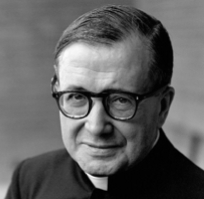 As our business has grown I’ve found it more difficult to take time for daily devotions such as morning and evening prayer and spiritual reading. However, I believe that they’re even more important in my life than ever before. It’s nice to be making a good living but you have to question why you’re doing it. Why do I work so hard? Hopefully it’s to fulfill God’s will.
As our business has grown I’ve found it more difficult to take time for daily devotions such as morning and evening prayer and spiritual reading. However, I believe that they’re even more important in my life than ever before. It’s nice to be making a good living but you have to question why you’re doing it. Why do I work so hard? Hopefully it’s to fulfill God’s will.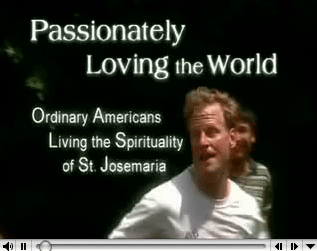 St. Josemaria Escriva has helped so many people change their lives by finding meaning in everything we do.
St. Josemaria Escriva has helped so many people change their lives by finding meaning in everything we do. 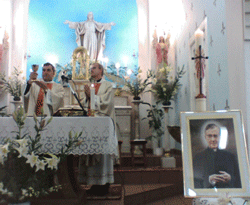 We didn’t have a special feast day Mass here locally on June 26 but they sure did in Sacré Coeur of Bucharest on June 9, 2007. D. Alberto Steinvorth and a Catholic priest from Buzau, P. Pavel con-celebrated.
We didn’t have a special feast day Mass here locally on June 26 but they sure did in Sacré Coeur of Bucharest on June 9, 2007. D. Alberto Steinvorth and a Catholic priest from Buzau, P. Pavel con-celebrated. Last weekend I went with my wife and daughter to see the latest Spider-Man movie. I am a long time comic book fan so of course I loved it. But I was particularly impressed with the underlying theme of the movie. This wasn’t just an action packed superhero movie, there was a very clear message. That message was forgiveness. One scene in particular illustrated this message perfectly. Spider-Man, finally consumed by hatred and revenge, realizes the terrible effect this has on his soul and flees to a nearby Catholic church. After spending some moments alone on the steeple (in prayer?) he descends into the bell tower and, with the help of the tolling bell, rips off the black garment he had been wearing which was an outward symbol of the vengeance within. It was such a powerful image and I thought, this is the healing power of confession!
Last weekend I went with my wife and daughter to see the latest Spider-Man movie. I am a long time comic book fan so of course I loved it. But I was particularly impressed with the underlying theme of the movie. This wasn’t just an action packed superhero movie, there was a very clear message. That message was forgiveness. One scene in particular illustrated this message perfectly. Spider-Man, finally consumed by hatred and revenge, realizes the terrible effect this has on his soul and flees to a nearby Catholic church. After spending some moments alone on the steeple (in prayer?) he descends into the bell tower and, with the help of the tolling bell, rips off the black garment he had been wearing which was an outward symbol of the vengeance within. It was such a powerful image and I thought, this is the healing power of confession!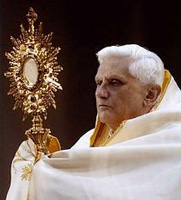 Yesterday I posted this quote from St. Josemaria:
Yesterday I posted this quote from St. Josemaria: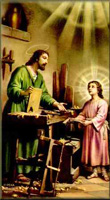 Today was the feast of St. Joseph the worker. St. Joseph could be considered a model for Opus Dei. He was regarded in the Bible as a good and just man and was referred to by his profession (“is this not the carpenter’s son?” Mt. 13:55). The emphasis on Joseph’s work in the Bible and throughout tradition speaks to the importance of our own work in the world.
Today was the feast of St. Joseph the worker. St. Joseph could be considered a model for Opus Dei. He was regarded in the Bible as a good and just man and was referred to by his profession (“is this not the carpenter’s son?” Mt. 13:55). The emphasis on Joseph’s work in the Bible and throughout tradition speaks to the importance of our own work in the world.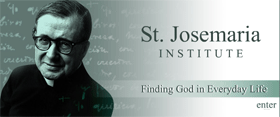 A 28 minute film titled, “Passionately Loving the World: Ordinary Americans Living the Spirituality of St. Josemaria” was premiered to launch the
A 28 minute film titled, “Passionately Loving the World: Ordinary Americans Living the Spirituality of St. Josemaria” was premiered to launch the  With all the hype over the Da Vinci Code movie I don’t think I need to say anything other than that it’s a good time to learn more about the founder, St. Josemaria Escriva.
With all the hype over the Da Vinci Code movie I don’t think I need to say anything other than that it’s a good time to learn more about the founder, St. Josemaria Escriva.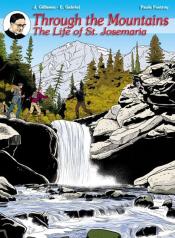 I’ve long been a comic book fan. I know I have one about John Paul II. I’ve sold off most of them but still have a few boxes of them.
I’ve long been a comic book fan. I know I have one about John Paul II. I’ve sold off most of them but still have a few boxes of them. On August 30 a statue of St. Josemaria Escriva was placed just outside St. Peter’s Basilica in Rome.
On August 30 a statue of St. Josemaria Escriva was placed just outside St. Peter’s Basilica in Rome.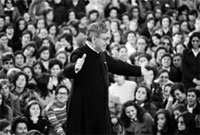 Welcome to PathToHoliness, a weblog dedicated to
Welcome to PathToHoliness, a weblog dedicated to